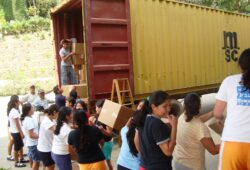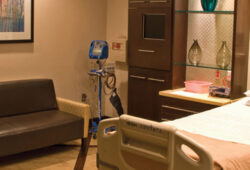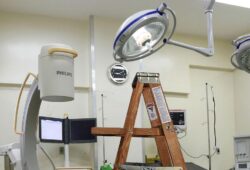Two years ago, RegionalCare Hospital Partners began searching for a way to use its employees’ skills in a volunteer humanitarian aid program. The search led the Brentwood, Tennessee-based hospital chain 1,500 miles away to Haiti, one of the world’s poorest countries, to launch a partnership to address the urgent medical needs of the nation’s populace.
“We began looking at different charitable organizations doing work in lots of places, and we found a great alignment with the Nashville nonprofit LiveBeyond,” says Jeff Atwood, vice president of communications at RegionalCare. LiveBeyond brings medical services, clean water initiatives and microfinance programs to disaster areas and developing countries, including Haiti.
For the past 18 months, RegionalCare, which owns and operates eight hospitals in small communities, has been sending groups of its physicians and nurses to LiveBeyond’s clinics in Thomazeau—an impoverished city of about 200,000 people near the capital of Port-au-Prince. In February, RegionalCare took the partnership to a new level with its involvement in the building of an outpatient hospital that will sit on LifeBeyond’s 65-acre campus.
Trauma surgeon David Vanderpool, M.D., founded LiveBeyond (formerly Mobile Medical Disaster Relief) in the aftermath of Hurricane Katrina.
After taking regular medical mission trips to Haiti since the 2010 earthquake, Vanderpool and his wife Laurie decided to retire there in 2013. They’re supervising the new hospital’s construction process, which former Alabama football coach Gene Stallings, Laurie’s father, has helped to fund. RegionalCare will provide much of the hospital’s equipment, beds and supplies.
The needs here are massive. According to the World Bank, Haiti has one of the world’s highest poverty rates at 77 percent. In Thomazeau, as on much of the island, many people still live in mud huts or other rudimentary housing. Only about 5 percent of children are born in a hospital.
“This area has no advanced healthcare at all, so the clinic is tremendously needed,” Atwood says. “Diseases the United States wiped out 100 years ago are still rampant in Haiti, and medical care that we take for granted just doesn’t happen there.
“Ear infections become deadly because fevers aren’t stopped,” he continues. “There’s very little clean water, and starvation is an issue. I’ll never forget talking to Dr. Tom Norman, who has been a physician for 30 years, after he returned from one of our trips. He said, ‘I never knew that food was a medicine.’ ”
RegionalCare’s employee volunteer groups visit the region approximately every other month, and the last team departed in June. Typically, 10 employees participate in each week-long trip, including two or three physicians and occasionally members of the company’s senior leadership team.
RegionalCare pays for its employees’ airfare and transportation costs and credits them for half the PTO time for the week. The teams stay at a guesthouse on the LifeBeyond campus, and each employee is responsible for $1,000 in food and incidentals.
Each team provides four medical clinics where they see between 150 and 250 people a day. The clinics are held both on-site at the LiveBeyond campus and in remote mountainous areas farther from Thomazeau, traveling in the back of pickup trucks across hilly terrain to deliver dental, wound and maternity care.
“It’s been amazing to get our employees engaged in this work,” Atwood says. “It has been a wonderful opportunity for them to get back to the heart of why they came into medicine. They don’t have to worry about electronic health records, coding, insurance claims, any of those things—their only job is to take care of the person right in front of them. They often come back saying things like, ‘This is why I became a nurse, this is why I decided to work in a hospital.’ ”
Atwood explains that employees return not only with more compassion, but also with freshly honed problem-solving skills.
“At home when your CT scanner is down 30 minutes for maintenance, you complain,” he says. “In Thomazeau, you can’t run a CT scanner because there’s no electricity, so you have to figure out a new way to help that patient in front of you. Our employees have returned home to find that they have a greater ability to handle and manage the work they’re doing day to day.”
Next year, RegionalCare will open the surgical wing of the hospital that will run on diesel-powered generators. “We’ll have to figure out what kind of processes and protocols to set up with limited resources,” Atwood says.
But there doesn’t seem to be a limit to the human resources on RegionalCare’s side. Atwood says volunteer teams that have been to Haiti want to go again.
“It has been transformational for our company,” he says.
Atwood says one of his organization’s goals is to accelerate the work that’s being done in Haiti.
“There are so many talented, compassionate people in the healthcare field, and we would love to help incorporate them in Haiti,” Atwood says. “The need for equipment and resources is huge, so we would love to connect with manufacturers that have extra equipment they’re not going to use.
“We don’t need—and can’t use—the super-deluxe equipment with built-in iPads; we need old ultrasound machines and hand-cranked beds that facilities or sales representatives no longer need. Those are the kinds of items that would be of tremendous use to us,” he says.
“People are in dire need of care. The bigger we can make the pipeline of people and resources, the better it will be for the people of Haiti.”
For more information on RegionalCare Hospital Partners’ work in Haiti and how to contribute, contact Jeff Atwood at jeff.atwood@regionalcare.net.
Share Email Missions, Social Stewardship





